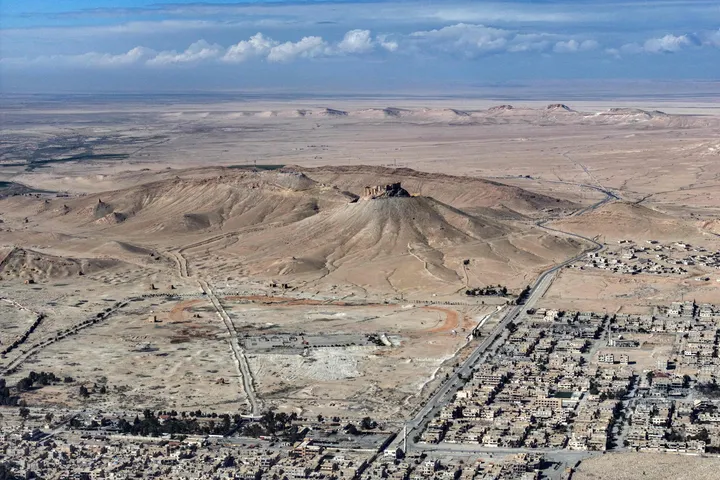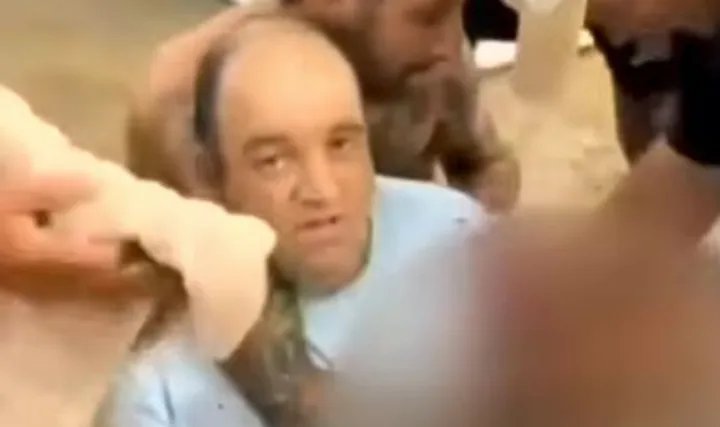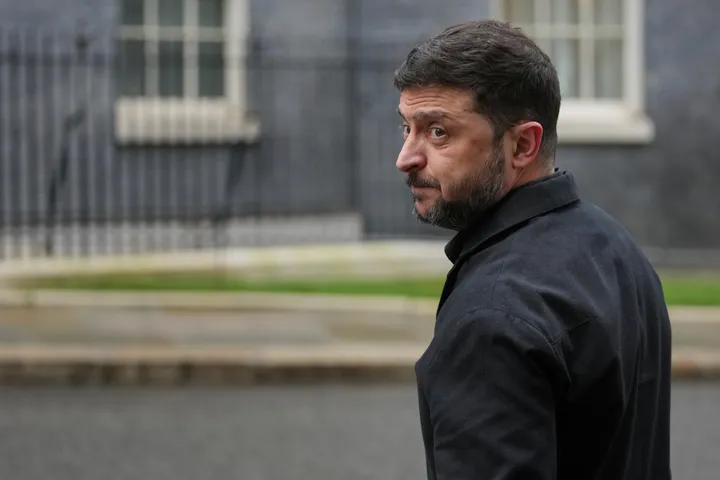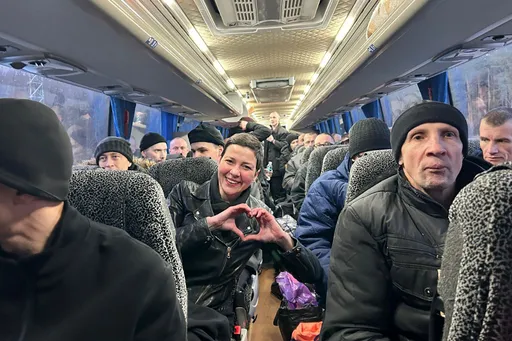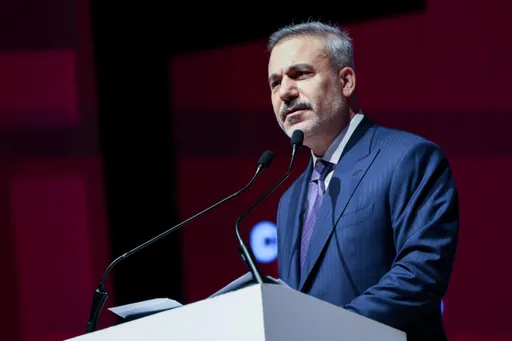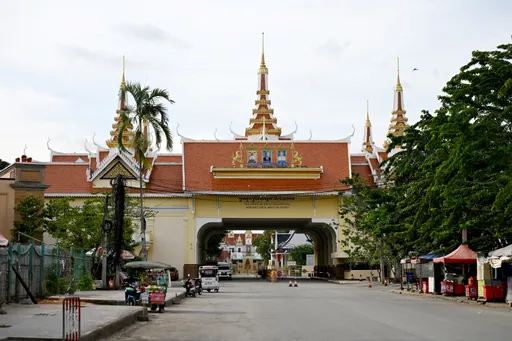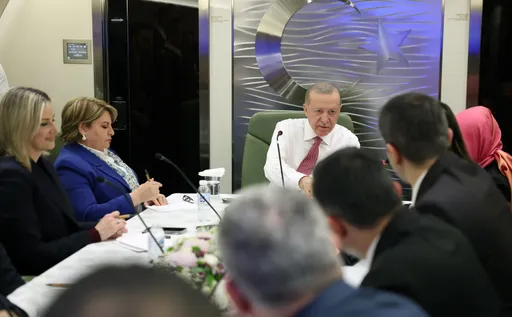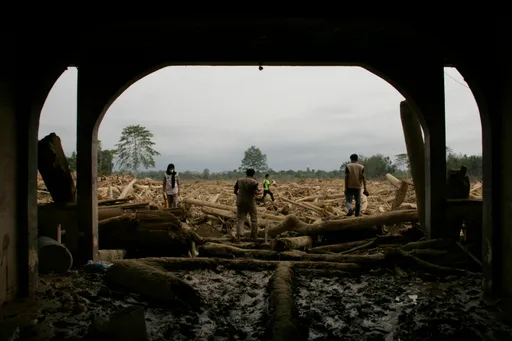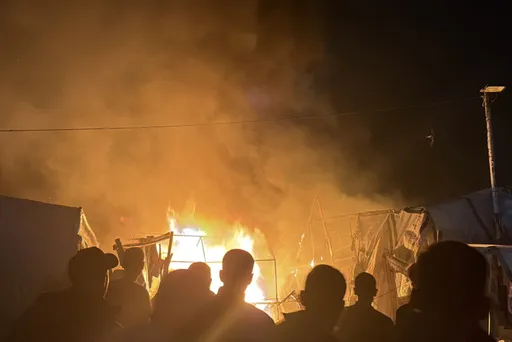American neurosurgeon David Hasan spent a week in Gaza on a relief mission with other doctors at the end of December.
While there, his wife tweeted dispatches of his observations, which touched on the dire situation facing Palestinians amid Israel's bombing campaign, as well as the strength and resilience of those around him.
Hasan recently sat down with TRT World to discuss the horrors he witnessed and what can be done to help people in Gaza.
TRT World: How did you even get access to go to Gaza?
Dr. David Hasan: Honestly, this was not even on the radar at all because the news on the ground was no one was allowed to enter Gaza at all. I was first told about it Dec. 13. I was told that a group from the United States and Canada would possibly be allowed to go.
And I think it became more evident after the United States played a major role in orchestrating the UN resolution 2720 which calls for immediate aid for different things like medical supplies.
Once that resolution passed, it became easier. So all we had to do was work with one of those non-governmental organisations. We worked specifically with Rahma Worldwide, which is a charitable organisation registered in the United States.
And they've been working with Gaza in different countries before. After that it became more logistics. So we moved really fast.
TRT World: What made you want to go? What was your motivation?
Hasan: Many reasons. One, I'm Palestinian. My parents are from the West Bank. They were displaced back in the 1960s. You can't help but feel camaraderie for people, but the most important thing, I'm a physician. And as a physician, I want to help whenever I can help. So that was an opportunity for me, especially knowing that there is a shortage of physicians and healthcare providers.
We're hearing they were exhausted because they've been working for 90 days nonstop. So, there were many factors, but mainly it's just humanitarian. As a human being, you need to help others.
TRT World: So you left your family around Christmas time to go. What was that like?
Hasan: My wife is a trauma surgeon and she decided after we moved to North Carolina to stay home and take care of our daughter. So she wanted to volunteer herself, but she wanted to volunteer after the war is over, in the rebuilding process.
So I encourage her to do that. But it became evident for me is this was an opportunity I wanted to take. Really, it was more personal than anything else. I just wanted to help. You hear this news, you watch the videos and the pictures. So when that opportunity opened, I jumped on it. It was a very hard decision for the family, especially me leaving around the holidays. And my daughter is seven-and-a-half years old, but she understands.
So it was very hard for both my daughter and my wife. And that was a sacrifice on their part to share me with the people in Gaza.
So it was easier once we started talking, especially to my daughter and explain, I'm going there to help people. And once she understood that she, when we went to Target to get supplies, she went on her own and got all the toys and lollipops to share with the Palestinian kids. And she was very smart.
I mean this is on her own. She said, "you know, you're American and because you're American, Israelis will not harm you because our president will not let them do that." So she had that understanding, and it helped a lot, but it was very hard on them. Kids are amazing. They're surprising. They're smarter than you think.
TRT World: So tell me a little bit about the journey itself.
Hasan: The first thing is you submit your name and a copy of your passport and a medical degree diploma so they know that you're really a doctor. Also your medical licence number and your blood sample. And supposedly the NGO will submit to the WHO. And the WHO submitted to the Egyptians and the Egyptian Red Cross, and then they submitted also to the Israelis because without their approval, you cannot get through. So it took complex coordination, layers of coordination to get through.
We were supposed to collectively meet and fly together. But because of the short notice, everybody just jumped on an available flight and met in Cairo. And then the next morning we travelled in a van. We were with two other groups.
So there were three, four vans, and we thought it would be a UN convoy, and a front car having the UN flag would help facilitate the travel. But to our surprise, it wasn't that. We just had to go on our own, and we all had to sign a waiver. The UN and WHO said they were not responsible after we crossed the border.
So it was on our own, which created a little bit of anxiety. In Egypt, you had at least 11 checkpoints from Cairo all the way to the Rafah crossing.
We thought there was a lack of coordination. Every time you stop, they want the passport. They want to ask who's going, why we're going, and different questions. And so it took us a long time to get to Rafah.
And when we got to Rafah, the Egyptian border was open, but unfortunately the Palestinian one was not, because we arrived after 6pm and over there, once it becomes evening, everything stops because you became a target (in the bombings).
So I think there would be a great opportunity for the UN and WHO to work on coordination and make it easier, faster, quicker and streamline the process. That was the first trip, so I'm hoping that future iterations will be better. But that's one of the things they could work on.
The, we went back to Al Arish. It's a small town, a military, uh, zone. So we stayed overnight, and then the next morning, we headed in and we were able to enter.
TRT World: Was it hard to go from Rafah to Gaza then?
Hasan: We met with ambulances and the hospital we were in, European Hospital, is only about five to seven kilometres from the border. It's through Rafah, which is still to some extent not as terribly bombed as the north. Once you get to Khan Younis, then you can see all the devastation.
Together, we were about six - five surgeons and one medical doctor. The surgeons included cardiothoracic, two orthopaedics, a trauma surgeon and myself as a neurosurgeon.
TRT World: When you got there, what stood out to you? Had you been there before?
Hasan: Gaza no, but West Bank yes. That was years ago. When we entered Gaza, you could completely see the street. There's no cars. And you could see again from that interval to Khan Younis to the hospital, you see some houses and some buildings just completely levelled.
As we entered the area to go into the hospital, we saw just a sea of displaced people, they're just really filling all that space between the main street, Salahaddin Street and the hospital. And so that was the first shock to see.
It took us about 20 minutes to just drive 100 metres to get through these people, to get into the hospital. And so that was the first sign of the distress of people, just seeing people crying. And then just that despair, if you will. You could see the despair among these people.
TRT World: And over your seven days there, what do you think people can't see about what's going on over there?
Hasan: I think words are different from seeing visually and living. One, it's a complete devastation in terms of buildings and infrastructure. Not only that, when we got there, we saw so many people with amputated legs, wounds on their faces.
And two, just going inside the hospital and just seeing people living in the hospital. They're starving and not able to access food, water, even the sanitation. I mean, here you have 50,000 people and the number of bathrooms that are in the hospital, which is a 200-something bed hospital.
Once you see it, it's imprinted in your heart and your soul and your brain, and it just can't leave you. It's just there.
And then no availability of water - even the sanitation is impossible, the buildup of the trash around. So visualising the devastation of the buildings, the despair in people's eyes, the injuries - from simple to severe - all that.
I don't think you could see it in the journals or on the TV, but seeing it and living it, and hearing people, I think, and living with them and seeing it one-on-one with these people. And once you see it, it's imprinted in your heart and your soul and your brain, and it just can't leave you. It's just there.
TRT World: What did the people tell you?
Hasan: It's a survival mode because one, they're displaced and have no home to go to. Number two, they live in a small corner, with the inability to access food and water. Sometimes they get it, but it's not sterilised. So you can get a lot of communicable diseases.
The injuries they had, almost all of the people I encountered lost at least one family member. And they're injured. Their access to healthcare is minimal. So the only people who are treated are the people who have trauma. If you have congestive heart failure or chronic disease like renal disease or dialysis or anything, tough luck. If you get an infection after the procedure, it's tough luck.
There's no antibiotics, or not enough antibiotics and not enough dressing to change the wounds and take care of the wounds. And not only that, people are compacted. So it's winter, the flu season, Covid is still around.
So I call that the tsunami because these communicable diseases became more evident and they started catching. And when I left, there's thousands and thousands of people catching them. And so imagine now, these people are vulnerable to this, not only to the trauma and the terror (of nightly bombings).
Every evening, before they go to bed, everybody hugs the family, kisses each other and says goodbye, because they don't know if they're going to wake up the next morning. Because the bombings actually start, most of it starts by sunset and finishes by 6 or 7am.
And so if you're injured, you stay there in your spot, no one can reach you, no one can get to you. And if you are alive by the morning, then people can reach and try to get you. So it is the terror every day, even if you're me as a physician, we live in a hospital which is supposed to be a protected structure.
Many times bombs were so close, and the building just shakes, really shakes like a leaf. I would say that I called it a leaf in a storm. So we ourselves thought that at any point that the hospital would be bombed, just because of the proximity and the sound of it.
And so imagine the families who were living outside in the perimeter of the premise of the hospital, with the kids and they hear these bombs. So the terror every night, it's just no words can describe it. And unless you are there yourself and living it and seeing it and hearing it, the feelings are just paralysing, terrifying - you just can't do anything. You just can't do anything. And just hope and pray that, you know, the morning comes really fast and they stop.
TRT World: What would you like to see after experiencing that? What would you like to happen in Gaza?
Hasan: Well, before you go to that one, a lot of Gazans try to differentiate themselves from Hamas. They want people to know that not all Gazans are Hamas and Hamas does not represent all Gazans. And number two, they're human beings. And because they're human beings, humanity should be like justice - blind to ethnicity, race, colour, gender, all that.
So they should be looked at as human beings, not like what some officials of Israel call them animals. Even animals, your heart goes out to them when they're in this condition. So they would like to be treated as human. And they're in despair, I mean, just in despair. And it's not their fault.
They're just caught in the middle. And people need to understand that they're not just collateral damage (whose deaths) could be justifiable. That's their message. When I used to finish procedures, I walked out in the evening and you could see people gathered, especially the men, around the fire. And they invited me to stand by and hang out with them. And that's their message, really. And, and you can see it in the kids. You hear that, "save us uncle, save us ahmo."
The next question you ask, what would I like to see: One, 152 countries around the world called for a ceasefire, but unfortunately it was vetoed. There is no hospital in northern Gaza, and there's about 400,000 people trapped in that area.
They have zero access to anything except maybe gauze and Betadine (antiseptic). And these people are in desperate need of a functioning hospital today. WHO cancelled their trip to northern Gaza because there was no security provided for them to travel. That was one of many of the trips that got cancelled. So they really need that (hospital). That's the most important.
Now we hear that also, central Gaza has one hospital, it's called Al Aqsa. And people are now moving the patients from Al Aqsa to European Hospital. So this means moving from central to southern Gaza, which if that happened, then that would break the last two functioning hospitals in the south or entire Gaza, if you will.
European and Nasser are the largest two hospitals now standing. So if these patients are transferred, then there's no access for patients in central Gaza. So not only northern Gaza now, but central Gaza would have no access to healthcare. Everything will be overwhelmed.
One of my colleagues said they've run out of supplies, and they don't even have gowns or gauze at the European Hospital. And so there's a desperate need for sustainable medical supplies... And that's the second (issue). The third thing is, these physicians over there, the healthcare providers are just exhausted.
So just imagine that you work so hard for 24 hours and you go the next morning to find that your family is dead and under the rubble. And that happened to two people I know personally. I met them and worked with them.
They're working nonstop 24/7 over the last three months. They need access to people like us to go in and help and give them a break. Also the most important thing, these guys, while they're exhausted, they come in one night and leave for one night.
And when they leave, because there's no communication, they don't know how their family is doing. So that mental stress - I have two colleagues who while I was there, they went home and their house was demolished and their family was killed.
So just imagine that you work so hard for 24 hours and you go the next morning to find that your family is dead and under the rubble. And that happened to two people I know personally. I met them and worked with them. And, there's two other people who got sniped while they were on their way home.
The other thing is the infrastructure for healthcare is just collapsing, literally. In terms of not only the trauma, but as I said, the coming tsunami is the communicable or non-communicable diseases. Once that hits, as you know, there's no infrastructure anymore.
The only people operating are the surgeons. And in the hospital it's just to manage trauma, which in itself is overwhelming. So those are the things. Access to water, food - the United Nations said that Gazans are around the corner of famine.
Well, actually, it's not around the corner. People are dying from starvation. Those are the ones who are trapped and don't have access to the hospital. Because once you get to the hospital, there is some access to some food and supplies.
They're saying when these 18 wheeler trucks, when they enter, Gazan people jump on it. Yes. Because they're starving. I mean, the kids haven't seen food for days.
Which brings me to another point. When we drove from Egypt, we saw miles and miles of 18 wheeler trucks. They're just sitting there for days, and cannot enter. And so by the time it gets there, the food in those trucks is either spoiled or not edible.
Again, the UN resolution asked to allow these trucks. There's not a lack of support and supplies. It's all on the Egyptian side. They cannot enter. And I think there's also a logistics problem of how to distribute it to these people.
We can't get all the way to northern Gaza. And that's in itself, 400,000 people have minimal access to food. So there is despair on multiple levels and a dire, dire situation. I've seen pictures and images of that, but this is on a different level, completely a different level.
TRT World: In one of your tweets, you said the UN or WHO was obstructionist sometimes. What did you mean by that?
Hasan: I think the higher ups, the executives, have good intentions. But on the ground, translating that and the logistics all behind it - for example, there are thousands of physicians who are ready to enter and help, but the process of doing that is very cumbersome. Two, a lot of physicians in the United States can leave for a week or two weeks, but they're not allowed to leave longer than that. And so now we just heard that you have to commit four weeks to go to Gaza.
And that just curtails so many physicians. No employer would not allow leave for four weeks to go in and volunteer. So that in itself is problematic. I don't know who mandated that, but it seems like it's coming from WHO.
And because of that, I was intending to go again. But I can't anymore because again, I can't take four weeks, two weeks is max. Also, once (physicians) enter Gaza, they're on their own. There's no security, no protection or anything. I mean, they will tell you that you are on your own with your NGO. And so that creates a lot of anxiety and despair in the physicians. Nothing is safe there.
I mean, an ambulance can be bombarded easily. So that's what I want. And the coordination among the NGOs, I think there's a lot of opportunities for the WHO on the ground to streamline the process, facilitate the process, and allow physicians. Because if they make it as rotations, if they make it one week to two weeks, I know personally there's hundreds here from the United States, from Europe, there are thousands (of doctors) from the Middle East who are ready to enter.
There's things that they have no control over, but they can help with the process.
TRT World: Do you want to tell any stories of any of the people you met there to leave people with?
Hasan: There's the head of the European General Hospital. His brother got killed with his family. And the guy showed up the next morning, no tears, nothing. Not like smiling, but trying hard to kind of put that face on because he has to run not only a hospital now, but a refugee camp.
Because he has not only the medical staff that he has to care for, but also the 50,000 people who live inside the premises of his hospital, and he feels like he's responsible. So the guy didn't even stop to think about who he's carried in his hands and pronounced dead and mourn or to say anything. He just had to move on.
The kids and family in my wife's tweet who didn't get or couldn't read the flyers (to evacuate in time). People are moving back and forth like a ping pong ball, people get tired at one point. Remember they're carrying everything they have and they're not carrying much. So they were in the house and people walked in on them and shot the mom and dad in front of them.
And suddenly this 10-year-old and the younger ones, they're alone. They had to wait until morning, alone with their dead parents, to be rescued and taken. Imagine this 10-year-old son, and these three kids are just with mom and dad who were killed in front of them, sitting with them all night, no lights or anything.
The problem is all the families are clustered together. Cousins, everybody all in one setting. And when a bomb happens, it kills almost the whole family. This kid came in by himself. There's no one with them to mourn - we just put them in a white bag and that's the norm. So there's hundreds and hundreds of stories.
Each one of them just reminds you of how human you are. The people have names. They have stories to tell, and they have feelings, and they're unfortunately treated as collateral damage.

